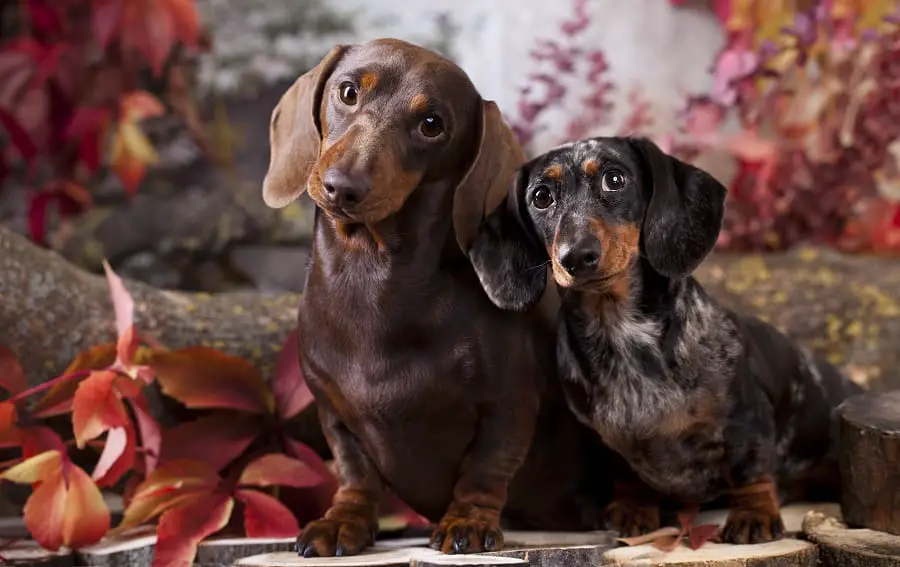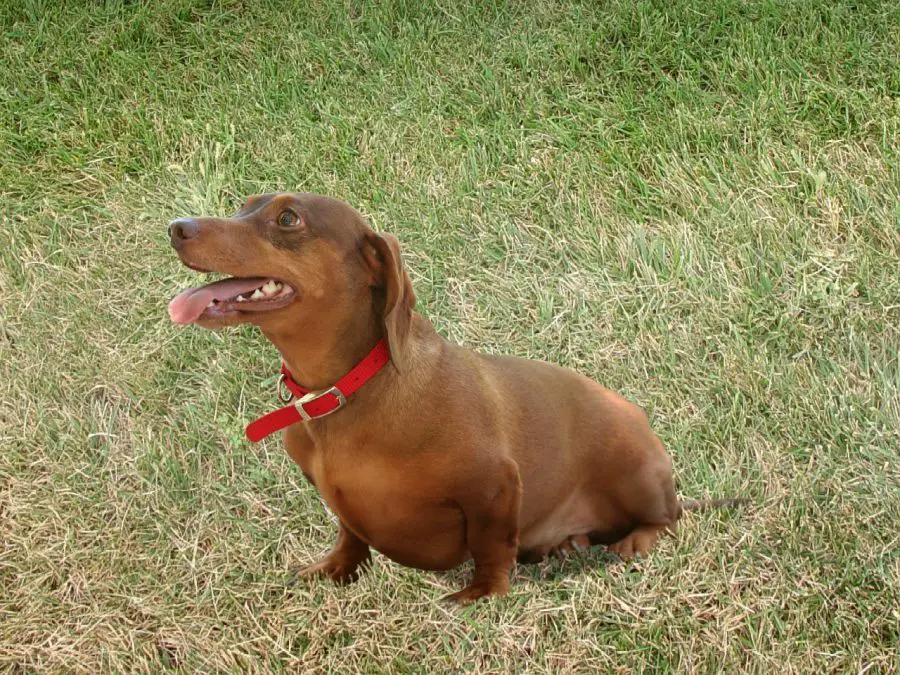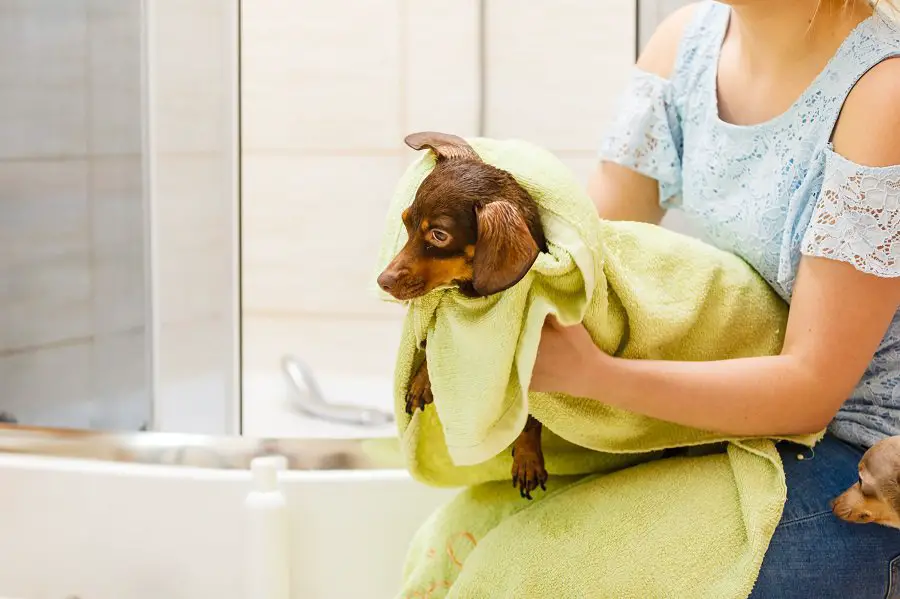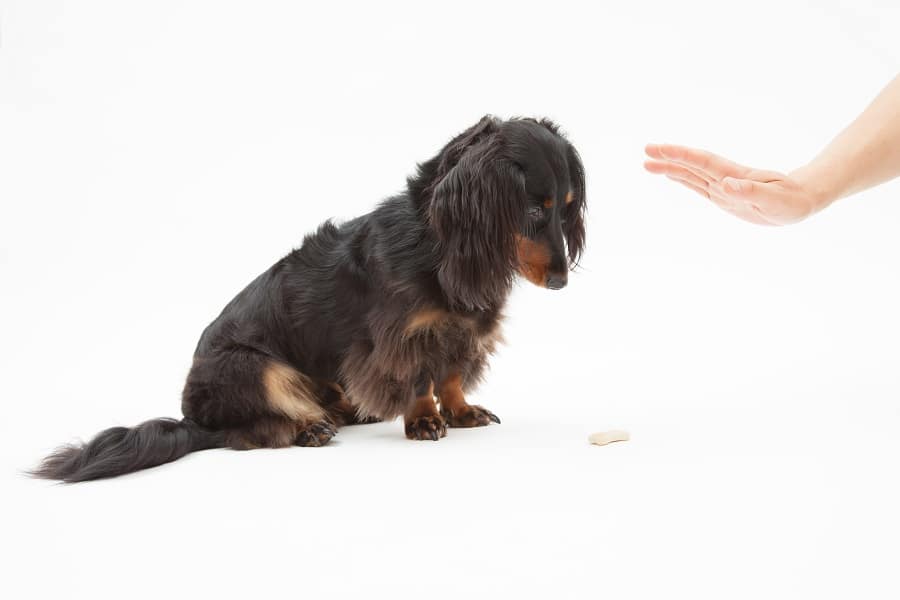A new Dachshund is a perfect addition to any family. They are curious, playful dogs that learn quickly.
As with any breed, it will take a lot of training and patience to make them into a good boy, especially early on, but the time and effort are worth it to ensure that your puppy doesn’t develop any bad habits.

New Dachshund owners may be wondering exactly how best to care for their new puppy.
In this article, we’ve outlined some critical first steps in both caring for and developing good habits in your new puppy.
Puppy Proof Your House
Be sure to clean your home before your new puppy arrives. Treat every nook and cranny of your house as though it might be a place for your new dachshund to get into trouble.
Do you usually leave dirty clothes lying around? Are there any cleaning supplies out in the open?
Have you left old food scraps or discarded pieces of plastic or trash underneath your couch?

Puppies are notoriously curious animals and all of these things could peak your new
Dachshund’s interest leading to either damage to your things or worse, harm to your puppy.
Take a few days before bringing your new puppy home to clean and inspect for any trouble spots.
Make sure your trash cans are sealed and that any small waste baskets you have won’t easily get knocked over or rummaged through by your puppy.
Be aware of potentially poisonous house plants or food you may have around your home.
Buy doggie door gates to prevent your dachshund from entering the spaces they shouldn’t.
Don’t forget to inspect your yard if you intend to play with them outside as well.
Research a Good Diet
Before bringing your new Dachshund home, make sure you have a good idea of what type of food they will need.
Most major dog food brands make special food for young dogs which helps them get exactly what they need as they grow.
It is ill advised, but if you plan to indulge your puppy with a few food scraps from time to time, make sure to know which foods are toxic and which ones can cause internal damage to your puppy.
Some popular foods that could end up hurting your new Dachshund are chocolate which contains ingredients which are toxic to dogs, grapes and raisins as they are known to cause kidney damage to puppies, and chicken bones which are hollow and can end up leaving splinters throughout your dog’s digestive tract.
Keep these foods away from your dog and always research before incorporating anything into their diet, even as treats.
Beyond the average nutritional puppy food, you may want to consider buying a few treats to help establish a reward system with your puppy for good behavior.
There are a variety of options, but as you establish a relationship with your puppy, you will get to know their specific tastes and which treats and foods they enjoy the most.
Find a Vet and Make The Most Out of the First Visit
Taking in a Dachshund puppy is a huge responsibility and at times requires seasoned experience to reliably combat issues that may arise.
Seeking out a good veterinarian will put you on track to maintaining your new puppy’s health, nutrition and safety.
Choosing the best option for you is usually not something that happens by luck and as such, may require a bit of research.

Some things to keep in mind when looking for a good veterinarian are:
Communication – Is it easy to reach out to your vet and set appointments? Do they answer your calls or emails promptly?
Are they dismissive of your worries without providing support or reasoning?
Medical Equipment – Good clinics will usually have a wide variety of equipment, but some of the most important pieces will be used for x-rays and ultrasounds, dentistry, and in house lab tests.
Ask any provider you are considering seeing if they have these services available or if they have the ability to send out lab tests and consult other, more seasoned vets.
Philosophies, hours, and other – While not as important to the care of your puppy, some other things to consider are your chosen facility’s philosophy, their hours of operation, access to medical records, and whether or not they are American Animal Hospital Association (AAHA) accredited.
Make sure the hours are convenient for your schedule and that their philosophies align with your own.
Ask if the AAHA has given the facility their blessing as this can be a big indicator of how well-run the facility is.
Make sure not to choose a veterinarian solely based on location or price-point as often times, your puppy may not end up receiving the best medical care and may suffer from the mistakes made later on.
House and Crate Train
Your new puppy will want to explore their new surroundings almost immediately, although they will tend not to stray too far from you.
In these early stages of development, you should take the time to establish good house habits in your Dachshund.
Create an adequate punishment and reward system in order to help them learn which habits are “good” and which ones are inappropriate inside of your home.
Before trying any of these training techniques with your new puppy, you must first learn to understand which acts reinforce the bad behaviors and which seem to combat them.
Raising your voice at your puppy if it is barking too much may increase their barking.
Removing your attention for a few moments may cue it to be more destructive as a way for you to focus your attention on it.
A lot of training involves experimentation and patience.
When you learn what holds your puppy’s attention and helps disrupt their bad behaviors, be sure to make a note of it and experiment with different ways to apply that technique.
Additionally, while your puppy’s curiosity is at an all-time high, it may find its new environment a bit overwhelming at times.
For these moments, make sure you’ve set aside a “safe space” for them to retreat to to relax.
Most Dachshund owners will have already purchased a crate before bringing their new puppy home, but if you have not, it is highly recommended for these early stages in your dog’s life.
Not only is it a good option for travelling with your puppy, but the crate will also provide a comfortable escape when your home becomes too chaotic for them to handle.
Train your puppy to enjoy spending time in their crate now as this will help as they grow older.
Allot Time for Play and Exercise
Keeping a good play schedule is a big part of training your new dachshund.
Setting aside time each day for play will not only keep your dog calmer, but, if you maintain a schedule, will help condition your puppy’s behavior overall.
Make sure that you are able to dedicate at least 30 minutes to an hour for play time or a light walk each day.
This will be especially important as your new puppy begins to grow into their adult body.

Keeping your puppy healthy and strengthening their joints and muscles can help prevent serious medical costs later in life.
A sedentary lifestyle can cause poor behavior in your puppy and may lead to them releasing their pent-up energy in negative ways.
Building healthy habits now will help reduce the huge amount of effort on your part to combat the negative habits your Dachshund may have developed instead.
Find a Bathroom Routine That Works and Stick to It
Your puppy is bound to have a few accidents before it learns that it shouldn’t go inside of your home.
Just like play and exercise, in order to reduce the amount of these incidents, it’s best to establish a bathroom routine early on and stick to it.
First, you must help your puppy understand that going to the bathroom inside your home is not a good behavior. You can do this in a number of ways.
Some people choose to take their puppy to a designated “pee spot” often throughout the day.

Others praise and reward their dog for going to the bathroom in the right place every time they do it.
The one tip to always follow is to clean the accidents they have in your home with enzymatic cleaners.
When a dog has an accident inside your home, the spot it leaves has enzymes that act as a beacon, signaling to your puppy that it is okay to pee there.
Using enzymatic cleaners will remove these pesky enzymes, leaving no trace for your puppy to come back to.
Once your puppy understands that it shouldn’t do its business inside, choose a few times out of the day to take them outside so that they can take care of it.
Most people take them out once in the morning and once in the evening, but make sure to pick a routine that fits your schedule and that you can consistently follow.
Also make sure that you are taking them at least twice a day, any less could make your puppy more prone to accidents and cause unwanted stress to both you and them.
Socialize your puppy
Socializing your new Dachshund early on is critical to ensuring that they’ll be good-natured, confident, and well adjusted for the rest of their lives.
The best time to do this is at the 7 week to 4 month age mark.
At this stage in development, your puppy will be shaping their future personality and how they’ll behave in social environments as an adult.
Introducing new people, dogs, places and situations now will make a big difference in how your puppy behaves in future situations.
Most breeders know that socialization is key and will begin to gently expose new puppies to the outside world and various situations.
As early as 3 weeks in (if your breeder is reasonable), Dachshunds begin to explore their environments and the people in them freely.
A knowledgeable breeder will encourage and reward this positive behavior as you should too later in their life.
Teach Obedience From The Get Go
As your puppy grows smarter and smarter, it will undoubtedly grow accustomed to some of the routines you’ve tried to establish.
If trained properly these routines will foster into good behaviors and will help ensure that you don’t have a “problem child” on your hands in the future.
One of the best things you can do early on is to teach your new Dachshund how to obey simple commands.
Dachshunds pick up on commands such as speak and the “name game” quickly with the proper training.

Once they have mastered these simple commands, they will be better at understanding new things you teach them as they grow.
In order to properly train your puppy, make sure you are in a quiet environment and that it is free of distractions.
Puppies are somewhat difficult to wrangle and train and added distractions will only make your job more difficult.
Once you are sure your environment is suitable to teach your puppy, you should start with commands that will ensure their safety.
This will help prevent your dog from running away and getting lost or getting into unnecessary fights with other animals.
To teach your dog some of these commands, set up a basic training scheme using rewards such as dog treats or other foods which they don’t normally receive.
This will help them understand the behaviors you are looking for and give them incentive to do them at your command.
Yes, it takes time
Raising your new Dachshund is going to be a time consuming and at times frustrating process.
Above everything discussed here, make sure to maintain an air of patience and calm with your new puppy as they grow older.
Following the tips we’ve outlined here will help to strengthen the bond between you and your new puppy while also reducing the stresses you may face later in your Dachshund’s life.
It’s a wonderful journey you’ve decided to embark on, but it is one that will be worth it for all the joy it will bring.
